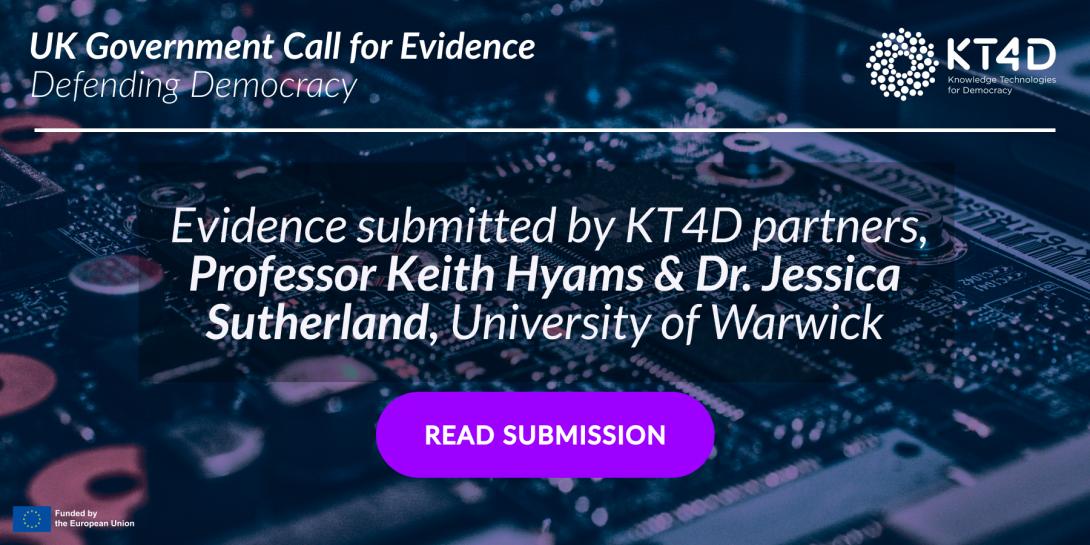UK Government Call for Evidence: KT4D Submission
10, April, 2024

UK Government sends out call for evidence
The UK Parliament sent out a call for evidence to experts in the hopes of obtaining information about how to strengthen democracy efforts both home and abroad. In an attempt to reinforce damaged democratic institutions and fortify vulnerabilities within the government, the Joint Committee on the National Security Strategy requested submissions to a series of questions for its inquiry into ‘Defending Democracy’.
The Government requested feedback on a wide-range of topics related to accountable democratic governance, election processes, the origination of undermining threats, establishing resilience, suppressing foreign interference, and the role of emerging technologies in civic participation, amongst many others.
KT4D Project Alignment
KT4D consortium members, Professor Keith Hyams & Dr. Jessica Sutherland from the University of Warwick, submitted a written evidence response to the UK call that specifically addresses how the absence of reliable enforcement mechanisms and an evident knowledge gap surrounding the potential threat of knowledge technologies, allows for AI and big data to compromise elections and weaken foundational democratic pillars without opposition or accountability.
Professor Hyams and Dr. Sutherland expanded on a handful of topics throughout their report, including knowledge technologies and their impact on civic participation, the evolving presence of misinformation and fake news, how citizens access and interact with information, and the importance of media literacy education and improving public awareness of technological interference.
Access to the full evidence report can be found here.
Hyams and Sutherland concluded their report by stating,
“Knowledge technologies, including artificial intelligence, have the potential to influence democratic participation because of the ways they present, create, and disseminate political content. Generative AI may pose risks to democracy because of its efficiency in creating disinformation, deepfakes, and fake news. These technologies can be utilised by bad actors to influence voting intentions and the national conversation online. Moreover, even if generative AI is not used to intentionally create political disinformation, it is unreliable and can hallucinate.
Recommender algorithms on social media and search engines also restrict citizens’ immediate access to information, even if unintentionally. The use of targeted advertising, which is increasingly accurate due to big data analytics, is also a concern for political engagement as who is targeted, with what, and for what reason is often not transparent and lacks accountability.”
-----
KT4D believes in participating in these types of research activities to not only spotlight the relationship AI and big data have on the democratic process, but to assist in the work being done to tackle the manipulation of these knowledge technologies and democratic erosion overall. Defending democratic values is imperative to ensure a stronger and united Europe. Supporting knowledge sharing projects like this helps address existing challenges, while protecting democracy in the medium and long term.
The most recent KT4D Policy Brief expands on the project's aim to defend democracy from the misuse of technological advancements in more detail, identifying a culture-centric approach to harness the power of emerging technologies.